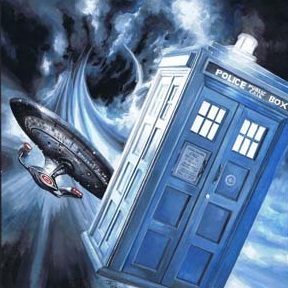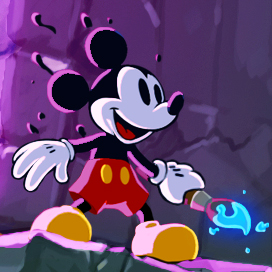Written by: Robert Shearman
Directed by: Joe Ahearne
This is such a good episode. The mood from the very beginning is great, and it’s got a kind of tension that leads right up to the reveal of the Dalek. This is another reveal that really early on made me hate the “next time” trailers, because it interrupts your ability to emphasize with the unknown Metaltron being tortured. Watching it for the first time I knew what the Daleks were, so it didn’t bother me as much that it was being imprisoned and controlled - it’s a deadly killing machine. But that’s not why its in prison, being controlled, it’s there because Van Statten is a horrible human being.
Van Statten is a great character. It can be very easy to verge off into cartoon villain territory with his type, but here I think it got the tone of overly confident self assured rich person you love to hate just right. In 2000s, we thought that in the future they’d be in bunkers, hiding away doing their evil deeds behind the scenes. Instead, nowadays they’re just openly evil out for everyone to see. When the doctor and his assistant plane him towards the end of the episode, that makes for a very satisfying ending. (Van Statten owns “the internet” - I wonder if he got conned into buying a little black box with a blinking light on top?)
The way the doctor is written and directed in this episode is fantastic. It’s a complete role reversal from what we normally expect. Often the Dalek (and Rose) take the position of the caring emotional one, and the Doctor is consumed by hatred. It’s nice that we see more of the background of what makes 9 who he is, and that he finally gets some sort of absolution to move on a bit, all the better that it comes from a Dalek pointing out that he is capable of love again.
I felt that this episode was trying to push a kind of romance, or at least light infatuation, between Rose and Adam, which just bugs me to no end. Rose still has an interest in Mickey at this point, there’s a budding relationship (not really romantic at this point) with the doctor, and Adam is just a completely unlikeable character. He obviously knows that his boss is torturing this alien, and he goes along with it because he gets to play with cool gadgets and have his ego stroked. Rose has more chemistry with the Dalek in this ep than she does with Adam.
The Dalek itself is great. The gold redesign looks amazing and less plasticky than the white and blue of old. The CGI is pretty good too. The contrast between the broken dalek that can’t even do a full 360 with it’s eye stalk, and later having some glamour bullet time shots as it rotates it’s middle section all the way around is really cool. The direction of having some of the deaths happen off screen with screams echoing down a corridor, and the Dalek being smart enough to use water to electrocute hundreds of people at once really adds to the fear, because an episode of death after death can get a bit much, so the variation helps.
Really good episode, and it has a nice message driving throughout that you should question your instincts. Also it continues a running theme of RTD’s in doctor who that a lot of the problems that happen do so because of greed.
The first perfect, or nigh-perfect of the revived series.
This episode does a couple of things exceptionally well. Firstly, it introduces the Daleks to a new audience. In doing so, they take something that’s unquestionably goofy-looking and goofy-sounding, and making it seem like a credible threat. The second the Doctor sees the Dalek, he absolutely panics, begging to be let out of the room. This leads to Eccleston spending the episode showing his true range, from that panic, to sorrow, to rage. It’s superb.
Related to that, we get the more complete update on what, exactly, the Last Time War was, and how it has affected the Doctor. He’s burdened by what he’s done, and what he’s lost, but won’t hesitate to justify it, and even gloat about it if the situation calls for it.
The supporting cast is quite good, too. Van Statten is the sort of character that often doesn’t land well on this series, but he works pretty well. Hiring an American actor to play the prominent American character helps a lot, and his dialogue seems more effective than “American” dialogue on Doctor Who often does. Anna Louise-Plowman is also pretty memorable in a role that would normally be a bit of a throwaway.
The episode is adapted from the Sixth Doctor audio story “Jubilee” - I’ve never listened to it, but the wiki summary suggests quite a lot was changed.
I guess the last thing I’ll note is that the gimmick of Rose’s DNA somehow repowering the Dalek is pretty silly, but its the sort of silly that makes a good story work.
I’m sure there’s loads more to say - I’m looking forward to hearing what others think!
Yeah I think this was the first episode of the revival that was like “Okay, they’re not fucking about with this” for me.
I’ve been saying for a while now that they need to recapture the feeling of this episode for the Daleks, where they’re actually a significant threat. I think it’s always tempting to have the big epic battle where the Doctor defeats all the Daleks all at once (which even this season did the next time they came back) but I think that kind of cheapens them the more you do it.
Just barely getting away alive should count as a victory when it comes to the Daleks, and doing something as big as destroying them all should be a Pyrrhic victory like the end of the Time War, not just the standard resolution IMO.
I’ve been saying for a while now that they need to recapture the feeling of this episode for the Daleks, where they’re actually a significant threat.
This is almost enough to be its own thread. I agree…but I’m also not sure it’s possible.
There are certain villains in sci-fi that are set up for inevitable diminishing returns. Usually, it’s because they are (a) immensely powerful, and (b) single-minded. I think the Daleks and the Cybermen fall into this grouping, as do Star Trek’s Borg.
When you set up an enemy like that…it seems like you can only really use them once or twice before you have to start making changes. Either they have to get less threatening, because otherwise it’s ridiculous that they keep getting beaten, or you have to start tweaking the “single-minded” aspect of them to find new storytelling angles.
With the Daleks, they’ve done both since 2005, to varying degrees of success. Hell, this episode does it to an extent, giving the Dalek a mutation to allow it to be unwilling to kill Rose, and eventually declare itself to be…not a Dalek, really.
But to keep them as a powerful, single-minded “kill everything” type of villain…it’s just not sustainable, even though they’re a powerful metaphor.
As much as I miss the crazy pepper pots, it’s probably a good thing that the RTD2 era has given them a “rest” so far (though I quite liked Chibnall’s Dalek-centred New Year’s specials).
Agree with everything here, this is a great episode that hums along on the strength of its writing and performances. Eccleston’s Doctor has a darkness that really suits where he sits in the timeline. Getting that first explanation of the Time War retroactively explains why he’s such a dick in this incarnation: he’s still deeply wounded by it but close enough to the man who did it that it very much informs who he is as a person, essentially still externalising that pain.
Something else that’s interesting is that I feel this episode gives the impression that it was Nine/Eccleston who in fact took part in the Time War, while leaving things open-ended enough that that could change. Jumping ahead a bit, Moffat’s earliest plan for “The Day of the Doctor” was to have Eccleston return. However, given his treatment at the hands of the BBC the first time around, Eccleston was unwilling to appear and we got the War Doctor instead. I’m not sure if RTD has ever commented on what it was he envisioned.
I’ve noted in previous rewatch discussions that I basically arrived fresh at New Who, but this episode reminds me that I did know Daleks couldn’t go up stairs. The “ELEVATE!” reveal was a major shock to the audience and canon at the time. In addition to its general invulnerability throughout the episode, this was a scene that really hammered home the Daleks as scary. For people completely new to the series like children, it doesn’t really mean anything, but anybody with a passing awareness of the show gets something in that moment to show them that Daleks are still able to do the unexpected. For adult fans, I could see this at least giving them a reminder of why they were afraid of them as kids.
The final confrontation is just amazing. That this episode manages to reintroduce Daleks, convince us they’re a worthy threat, show us their true face and make us feel bad for them across 45 minutes is just excellent work from top to bottom. I’m a broken record on this, but that it’s done in such a low-key and probably low-budget episode and not via an episode full of explosions and CGI is a testament to what the show can do at its best.
One thing I’ll say is that it might have been interesting to call the episode “Metaltron” instead of “Dalek” to keep the surprise hidden, but I imagine that would have hurt it in terms of viewership. People definitely would have been excited to see the latest take on the Doctor Who enemy in a way that they probably wouldn’t have been to see “Metaltron”.
Sorry to be a downer, but I was curious why Bruno Langley, who plays Adam Mitchell (“Little Lord Fauntleroy”), seemed to drop off the face of the Earth a few years ago. If you don’t want to open it, you can probably guess from the spoiler heading:
tw: sa
Langley sexual assaulted two women in 2017, for which he was convicted and sentenced to a year’s community service and 40 days of rehab. He was made to wear an e-tag and added to the sex offender register. Nobody has hired him to act since. He’s attempted to start a music career instead. No thanks.
At least he’s not around for long!



